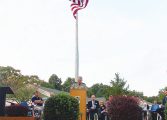By Page H. Gifford
Correspondent
It was in June of 1960 when Larry Strauss graduated from high school and was about to begin his first semester at New York City Community College. He needed a worthwhile yet rewarding activity that summer and signed up as a volunteer at the Brooklyn Red Cross Chapter office. After basic and instructor training, he taught First Aid then his other assignments included teaching Pet First Aid, (sometimes referred to as “Mouth to Snout” classes), AIDS-HIV Prevention, general orientation programs, and recruiting tasks. Once he became a psychologist, he found his niche within the organization, and on July 31, he received recognition for 60 years of service there.
“It wasn’t until I began serving as a Disaster Action Team (DAT) member, VISTA (Americorp) volunteer, and later mental health responder, that I became more aware of and encountered people who were experiencing varying degrees of stress and emotional challenges,” he said. “Oftentimes following catastrophic events such as house fires, natural or man-made disasters, or personal stressors, result in traumas that often tax people’s abilities to cope.”
He has responded to a surplus of disasters over the years, including fires, floods, tornadoes, hurricanes, shootings, and terrorism. Most volunteers would have burned out long ago. His connection to these events and his experiences have helped him adapt to various situations.
“The common element for those affected, in virtually all cases, involved surviving the emotional aftermath of the trauma. Each disaster setting involved different dynamics, alternating settings, and unique issues. Each time I was deployed, I became more aware of, and appreciate different cultures, and simultaneously developed a stronger sense of involvement, connection, and personal fulfillment. Each event provided me with a viable opportunity to become personally validated, use my psychosocial skills, and be able to give back to my community.”
When Strauss talks about community, it is in that moment where he is needed most, whether it is in Alaska, Texas, Mexico, Michigan, Maryland, Oklahoma, Kansas, New Jersey, New York, or Virginia.
“The Red Cross was always there to provide non-judgmental support, assistance, and as possible, healing to those individuals impacted by that event.” It is easy to see Strauss as a calming effect on those who need someone to listen and understand their fears. Talking to people will give them hope but listening is Strauss’ strength.
“Support is available and can be as simple as providing creature comfort items such as snacks, toiletries, toys, etc.,” he said. “It can also involve crisis counseling, follow up contact, and/or referral to other service agencies. Most people are resilient and able to work toward resolving post-disaster trauma, while others may require additional intervention.”
Strauss has seen first-hand the mental health component evolve over the years and is knowledgeable about the role of Red Cross volunteers. The Red Cross has strengthened and increased programs that provide both mental and spiritual support during disasters.
“Volunteers, through in-service programs, and other training opportunities have become better able to recognize and refer, as needed, clients experiencing emotionally charged issues occurring during a disaster operation. Mental health and spiritual professionals are there to provide more in-depth crisis assistance whenever possible.”
Although Americans have never experienced a worldwide pandemic of this magnitude within the last 100 years, Strauss is witnessing a different disaster in the making.
“Today, we face a perfect storm of ongoing challenges. We are, by Pandemic-mandated decree, more isolated, and less socially engaged. We are faced with a national economic slowdown and ongoing political turmoil. Additionally, there have been more visible and destructive weather problems throughout our nation.” He adds that The Red Cross has been responsive during the pandemic by activating virtual classes, counseling informational programs, and advanced communication efforts. As a mental health professional, Strauss has been able to provide virtual classes to veterans and others, in methods of coping with the pandemic. This includes sessions on recognizing and effectively responding to personal crises.
“We all need to work together to handle the stresses of today. As Martin Luther King said, ‘Our lives begin to end the day we become silent about the things that matter.’ By volunteering, I have been given a voice to respond to the things that matter and hopefully continue to do so into the future.”




